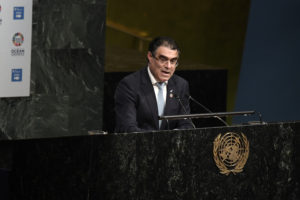 United Nations Conference to Support the Implementation of Sustainable Development Goal 14: Conserve and sustainably use the oceans, seas and marine resources for sustainable development
United Nations Conference to Support the Implementation of Sustainable Development Goal 14: Conserve and sustainably use the oceans, seas and marine resources for sustainable development
Plenary Meeting , 6 June 2017
Excellencies, Ministers, Distinguished Representatives, Ladies and Gentlemen,
It is a great pleasure to take part in this conference, which brings us all here today to discuss, exchange views and ensure the continuity of our efforts for the protection and conservation of our seas and oceans.
Throughout human history, our survival and prosperity was weaved with the fate of the oceans which are the source of all life on Earth: oxygenating our atmosphere, absorbing carbon dioxide, regulating the world´s climate and supporting the richest biodiversity on earth. Marine ecosystems are essential to sustain all life on earth.
Furthermore, hundreds of millions of people rely directly on marine biodiversity and resources for their livelihoods. Oceans have been a significant food source since prehistoric times and have supported our survival and prosperity for thousands of years through fishing, aquaculture, transport, tourism and recreation. More recently new ocean-related resources and fields of economic growth have been revealed, like the extraction of minerals and hydrocarbons and the production of medical substances like antibiotics from marine organisms. But the contribution of the oceans to our well-being and quality of life goes far beyond recourses – it extends to the beauty of open seascapes and wide horizons, the oxygenated air and the feeling to be part of nature. Although these services cannot be priced, they are essential for our health and survival.
However all these blessings provided by our seas and oceans are under thread from our polluting activities such as marine debris and nutrients from land based sources, shipping, dredging, overfishing, illegal and destructive fishing practices, oil spills from offshore hydrocarbon extraction activities and global warming.
The Mediterranean Sea, from where I come from, hosts a wide range of unique and diverse marine life and is considered as one of the 25 global biodiversity recognized centres. It’s a biodiversity “hot spot”. The protection of marine biodiversity is critical for the historical and cultural heritage of the Mediterranean and contributes enormously to the economic development.
The conservation and sustainable use of marine biodiversity underpins sustainable development in the region and is essential to maintain healthy and productive ecosystems for the current and future generations. Today, the Mediterranean faces multiple challenges due to unprecedented biodiversity loss arising from overfishing, habitat destruction, intensive urbanization and tourism, overexploitation of resources, maritime transport, pollution and climate change. The Mediterranean is also particularly vulnerable to the introduction of alien species, several of which are characterized as invasive and cause significant problems for native species and habitats.
The protection of our seas and oceans can only be achieved through global and regional cooperation. At an international level the Convention of Biological Diversity provides the necessary tools for the creation of Marine Protected Areas. In parallel to this international process, there is a number of regionally focused initiatives deriving from regional conventions or institutions like the European Union. For example, Specially Protected Areas are established under the framework of the Barcelona Convention while the European Aquis provides for the establishment of marine Natura 2000 protected sites.
Ensuring the protection of our oceans through the establishment of Marine Protected Areas is very promising but challenging as well. The sustainable management and protection of marine and coastal ecosystems including the strengthening of their resilience and taking action for their restoration, is crucial in order to avoid significant adverse impacts and achieve healthy and productive oceans.
The obligation for the protection of the marine environment does not lie however, only on governments. Stakeholder involvement in the establishment and management of the marine protected areas is crucial for this effort to be sustainable and successful. Exchange of knowledge and best practices, the development of research capacity and the transfer of marine technology and expertise to the states which may need and request technical assistance in this field is equally essential.
Ladies and Gentlemen,
We all committed to the success of SDG 14 and we must support this commitment with actions in the field. First of all however, we must all flag our political will and decisiveness to make the best use of the available tools to conserve our oceans by implementing international law as reflected in the United Nations Convention on the Law of the Sea, which sets out the legal framework within which all activities in the oceans and seas must be carried out.
I, also, wish to state, in this regard, that Cyprus fully supports the ongoing efforts for the development of “an international legally binding instrument under the United Nations Convention on the Law of the Sea on the conservation and sustainable use of marine biological diversity of areas beyond national jurisdiction”.
Today’s gathering is a proof of our commitment to protect our oceans and to preserve them for the whole humanity and the generations to come. Our shared vision for sustainable oceans can be only be achieved through the building of strong commitments and solid coordinated actions for the conservation and sustainable use of marine biodiversity and resources, a goal I may am sure we all share.
Thank you for your attention.